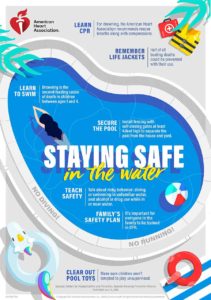We’ve all had to adjust to and accept pandemic living. When it comes to addressing canceled trips, playdates and a drastically different summer overall, the key is to take a direct approach and not sugarcoat things. Kids are smart. So, give them a little credit during those tough parent-child conversations. The most important thing to remember when you’re talking to your child is that it’s not necessarily what you say, but how you say it. You need to be direct and to the point. Let them know the reason behind why they can’t do the things that they use to. It is also the same for adults but the majority have the key factors already major enough in knowing how to deal with it. It is harder on the child.
To help your child understand why being around a lot of people isn’t a good idea right now, she suggests an approach like this.
“Nearly all children can remember being sick at some point in their lives, and germs are something that most children can understand the concept of. Start a discussion with your child about how germs are very tiny and when they enter our bodies, they make us sick. Explain what covid is, how you get it but most important is how to prevent it. They have been saying it for months to social distance and get the VACCINE!
Physical distancing can be a difficult concept for some children to understand. You can also use items to illustrate how far six feet away really is. Use their toys, the length of a pet or even their favorite foods to show the distance (for example, six medium pizzas equal six feet). Kids notice everything. So, they’re bound to notice when people are too close and know when someone is wearing a MASK!
It’s hard for little kids to resist touching things (Ex. public things like a public toilet, public counter, etc…). They can’t help it. Kids explore their world through touch. If you think about babies, they’re putting everything in their mouths. Parents urge your little ones including the little ones they play with to not touch their face.
Should your child struggle with the concept of not touching things, their face or others, try not to get upset. If you respond in a negative way like angry or anxious, it will only make your child more anxious and forgetful due to there reaction of your negative reaction to them. You want them to remember this in not touching their face.
Washing the hands and using purex or something like it to help keep the hands clean!


